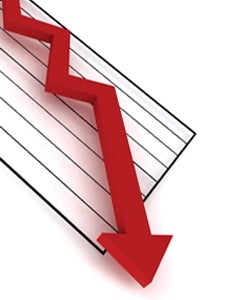With all the drama on Wall Street in recent weeks, the stocks of Central Massachusetts companies have been plummeting and bouncing around just like the rest of the market.
Of the 20 locally based publicly traded companies reviewed for this story, all but one saw double-digit declines in stock price from June 30 to Oct. 10.
In particular, relatively small public companies with a focus in technology have taken some major hits.
Michael J. Radzicki, an associate professor at Worcester Polytechnic Institute, said it makes sense that a region like Massachusetts, where many companies are in innovative, potentially vulnerable sectors, would face trouble in tough economic times.
“When the economy is doing poorly, money managers will move stocks from sensitive companies to utilities, consumer staples,” he said. “Your firm’s sector is going to be influenced by this sector rotation.”
Still, Radzicki, who has created an index of Central Massachusetts firms as a teaching tool for his classes, said the area is currently in line with the stock market in general, as measured by the S&P 500.
Big Drops
Between June 30 and Oct. 10, when the market hit one of its lowest points, Marlborough green energy poster child Evergreen Solar saw its stock drop 64 percent. Candela Corp., the Wayland developer of laser therapies fell 57 percent, while Natick-based dental lab company National Dentex Corp. dropped 53 percent. Two high-tech companies, Double-Take Soft-ware of Southborough and Virtusa of Westborough both fell 48 percent. (Check out this detailed chart)
More traditional companies weren’t exempt from the turmoil, either. Athol tool manufacturer L.S. Starrett dropped 50 percent, and Framingham construction giant Perini Corp. fell 47 percent.
BJ’s Wholesale Club and TJX Cos. dipped just 10 percent and 18 percent respectively. Maury Tamarkin, a professor of finance at Clark University, said it makes sense that those companies would see less of a drop that average.
“Companies that won’t do quite as poorly are companies that are food-related, because people are going to continue to eat,” he said. “Also you’d expect in a poor environment that companies that sell their wares at a discount are going to do better than full bust-out retail.”
One company that actually saw its stocks rise over the past few months was Marlborough IT company 3Com. Early this year, after regulators blocked a buyout offer involving a Chinese company, 3Com stock fell from more than $4 to less than $2. Over the last few months it has bobbed up and down a little and actually gained some ground, hitting $2.25 on Oct. 10.
Insurance Standout
Meanwhile, one local company in the hard-hit insurance sector didn’t do so badly. While the S&P insurance index fell 48 percent, Worcester-based Hanover Insurance Group dropped just 22 percent. Barclays Capital said in late September that it considers Hanover a better bet than the industry as a whole thanks partly to higher premium growth, expense savings opportunities and the potential for an upgrade from ratings agencies.
And on Oct. 14, Bank of America also reiterated its recommendation of Hanover stock. The analysis said that, despite the company’s $21 million exposure to Lehman Brothers and $17 million to Washington Mutual, the company’s losses should be manageable.
Radzicki said stock prices aren’t necessarily the best measure of the health of a company, or a region, especially in the short term.
“I’d be more worried about a recession vis-a-vis my job than I would about the share price at my company,” he said. “The share price is more of a canary in a coal mine kind of thing rather than the underlying cause.”
He said companies that are looking at falling prices may need to wait until the economy as a whole improves again. For technology-intensive local firms, he said, the same volatility that made their stock prices plummet in recent weeks could mean a quick rise in a recovery.
Meanwhile, for those concerned with the fate of the Central Massachusetts economy, Tamarkin said the stock market in general is often a good predictor of where conditions are headed, but it’s probably better to watch the market as a whole rather than individual local stocks.
“I wouldn’t be so concerned about the local companies,” he said. “I’d be more concerned about what’s going on nationally. What’s going on nationally is, of course, going to impact the local companies, but I don’t feel that there’s anything in particular going on locally that’s not going on nationally.”

